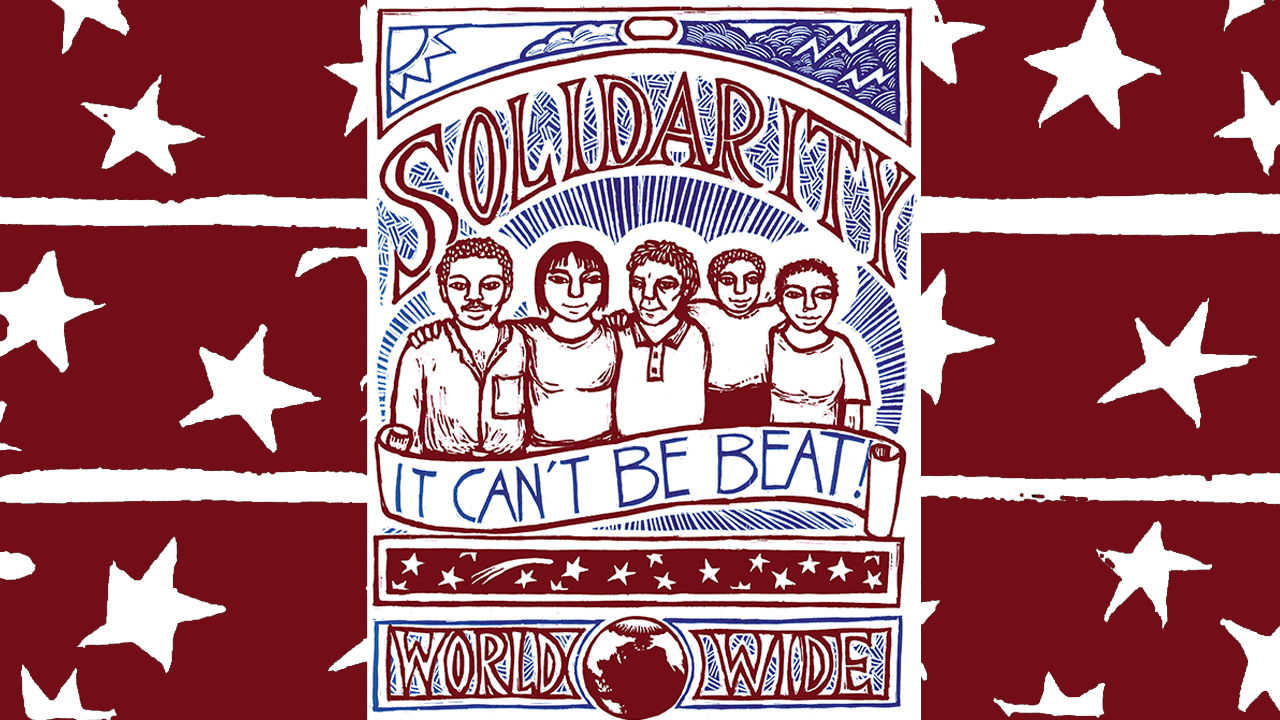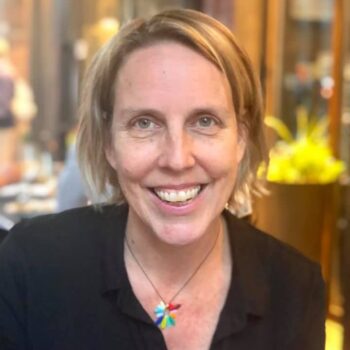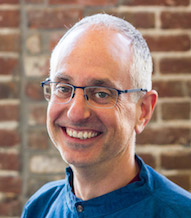When we asked veteran organizers how their work transforms public narrative, they told us stories. Stories about Walmart employees sobbing during a trip to the museum funded by one of the Walton family heirs, her “vanity project” paid for by their underpaid labor. Stories about Laotian immigrants who fled war and Agent Orange only for their children to suffer asthma from the chemical pollution in their new neighborhood. Stories about immigrant teenagers undertaking a 1,500-mile pilgrimage to change the country’s immigration laws.
These stories demonstrate the power of narrative — to shape the way we make sense of our world and the possibilities for changing it.
This issue of The Forge explores the role of narrative in shifting the balance of power and building a more equitable society. We talked to thirteen organizers across the progressive movement about how the current moment has created an opening to challenge the dominant neoliberal narrative and introduce transformative ways of seeing the world. We learned a lot more, including the ways community organizing has evolved since its origins in the mid-twentieth century, with organizers increasingly willing to wage battles at the ideological and narrative level. We explored organizers’ views on the impact of neoliberalism and its worldview, the transformative effects of narrative in propelling change and shaping ideology, and the best ways of integrating narrative strategy into organizing campaigns.
What we heard was profound, energizing, and hopeful.
-
Andrea Dehlendorf, a Co-Director at United for Respect, talked about the struggles of low-wage workers and the campaigns they lead to transform our economy.
-
Richard Kirsch, the Director of Our Story, The Hub for American Narratives, discussed his work building public support for the Affordable Care Act.
-
Annie Leonard, Executive Director of Greenpeace USA and founder of the Story of Stuff, discussed the ways capitalism and an ideology of exploitation lead to climate change — and how environmentalists are changing their strategies to build power.
-
Zach Norris, Executive Director of the Ella Baker Center for Human Rights, talked about race, policing, and incarceration and shared strategies for reinventing public safety.
-
Tara Raghuveer, Campaign Director for the Homes Guarantee at People’s Action, discussed housing campaigns and the importance of a long-term agenda.
-
María Rodriguez, co-founding Executive Director of the Florida Immigrant Coalition, discussed how the immigrant rights movement has worked to change the public conversation about immigrants.
-
Doran Schrantz, Executive Director of ISAIAH and Faith in Minnesota, talked about how her organization is promoting robust democracy by building people’s agency, voice, and power.
-
Communications expert Anat Shenker-Osorio, the only one of our interviewees who is not an organizer, helped us understand how narratives structure our thoughts — and how we can change them in order to win elections, campaigns, and broader social change.
-
Ishita Srivastava, Director of Culture Change at Caring Across Generations, and Kristina Mevs-Apgar, Culture Change Director at the National Domestic Workers Alliance, talked about the challenges facing caregivers, both paid and unpaid, and the role of culture in making change.
-
Anthony Thigpenn, President of California Calls, discussed his organization’s long-term strategy for building power to tackle right-wing tax policy.
-
We had a wide-ranging conversation with Dorian Warren, Executive Director of Community Change, who touched on the racist origins of neoliberalism, new opportunities for transformative campaigns, and the need for a Third Reconstruction.
-
Evan Wolfson, who founded and led Freedom to Marry, the organization that helped win marriage equality for gays and lesbians, told us how that campaign changed public opinion about gay people.
-
Miya Yoshitani, Executive Director of the Asian Pacific Environmental Network, talked about her work with low-income Asian immigrants and the possibility of replacing the extractive economy with a regenerative one.
-
Richard Healey and Sandra Hinson, who founded and previously ran the Grassroots Policy Project, wrote a concluding essay that reflects on the changes in community organizing over the last three decades and the need for further evolution.
From these wildly diverse conversations, a common set of themes emerged.
We face a powerful adversary
The organizers we spoke with identified neoliberalism — the free market economic and social order that has dominated the U.S. and most of the rest of the world since the 1980s — as a root cause of the challenges they address. Andrea Dehlendorf told us how private equity firms bankrupted Toys “R” Us and abandoned its employees, devastating the families of tens of thousands of workers. Ishita Srivastava and Kristina Mevs-Apgar reminded us that caregiving is intentionally excluded from economic measures. María Rodriguez explained how extractive economies exacerbate inequality and destroy the environment, which forces people to migrate. Zach Norris reminded us that financialized capital creates the conditions — inequality, recessions, and housing shortages — that lead to street crime while obscuring the far more wide-reaching crimes carried out by corporations.
Neoliberalism is a hegemonic system: it dominates not just through institutional, economic, and political power but also through its intellectual and cultural grip. Just as neoliberalism has remade the economy, infiltrated politics, demolished labor unions, rewritten the rules of global trade, shrunk the public sector, and deregulated a variety of industries, it has also changed the way we think and talk. Neoliberalism has transformed our way of making sense of the world — all while making itself invisible by persuading us that it is inevitable and permanent, a bedrock part of the order of things. Margaret Thatcher’s ominous phrase, “There is no alternative,” captures neoliberalism’s totalizing hold.
All the organizers whom we spoke to identified neoliberal narratives as pervasive challenges in their work, whether they focus on low-wage workers, healthcare, the environment, the care economy, immigration, housing, or policing. The intellectual obstacles they mentioned include the dominance of markets, the delegitimization of government and collective action, and the reduction of the social world to the individual human being. Racism interacts with all these ideological themes, the incendiary fuel that powers the engine of neoliberalism.
We Can Change the Story
Community organizers are sophisticated strategists. A central part of their work involves challenging neoliberal orthodoxy and offering a different set of narratives. When we asked organizers how they responded to the tropes of the neoliberal worldview, we heard six themes:
-
Participatory, active democracy. Together, we have the capacity to determine our future. Through our individual agency and collective power, we can shape the conditions that affect our families and communities for the common good. We need to reclaim our government.
-
The greater “we.” We care for our families, our communities, and one another. Through solidarity and collective responsibility, we develop, flourish, and survive.
-
Radical inclusion. All human beings are deserving of dignity, respect, autonomy, and social inclusion. Reparations and targeted universalism are critical components of inclusion.
-
The economy serves human and social development. We all contribute to the economy, whether at our jobs or at home. We are all stewards of our environment. Social institutions and infrastructure are a collective creation. What society creates, therefore, rightfully belongs to all of us.
-
Our environment is sacred. Earth’s land, air, water, and resources are vital for our health, well-being, and liberation. We need a balanced relationship with the environment.
-
Freedom. Freedom is the capacity to reach one’s full potential. Freedom depends on inclusion and equity in the public arena; the elimination of structural racism, patriarchy, and other forms of oppression; self-determination and full participation; and economic and social systems that serve human development.
There were some areas of disagreement. We came into this project interested in talking about shared wealth and abundance. Many organizers thought those terms were useful, but Anat Shenker-Osorio worried that this way of talking emphasized money over people. Annie Leonard suspected that many people struggling to get by might be skeptical of a narrative of abundance; she also reminded us that we only have a surplus because our economic models fail to account for the costs of extracting resources from the Earth.
We found more agreement around this phrasing: “As a society, we have enough for everyone to thrive.”
This is a moment of opportunity
We were surprised and delighted by how hopeful our conversations were. The organizers we spoke with were unanimous: this strange time we are in — inflected by death, despair, racism, and uprisings — is also a moment of opportunity. Because of COVID-19 and the uprisings for Black lives, policies are on the table today that seemed impossible just months ago. In the face of such a radically contingent future, social movement organizations are ideally placed to make change. Community organizers and progressive advocates have an opportunity to lift up ideas we’ve been fighting for over the last forty years. As Miya Yoshitani told us: “These are the moments our movements are built for.”
Recent successes fueled such optimism about the future. We heard story after story of organizers successfully changing narratives to win policy change. Through the Freedom to Marry campaign, Evan Wolfson told us, the country transformed its view of LGBTQ people. Through campaigns for the DREAM Act and Deferred Action for Childhood Arrivals, Maria Rodriguez explained, people understood young immigrants differently. In both cases, shifts in public thinking were crucial for winning policy changes. Richard Kirsch told us how the fight for the Affordable Care Act changed expectations around healthcare, and Dorian Warren reminded us that the Fight for $15 normalized an idea that started off as radical. Tara Raghuveer shared stories about elected officials and candidates adopting the language and policies of a “Home Guarantee,” the idea that everyone in the country deserves a home. Organizers continue to seek out campaigns that can change the conversation and experiment with narratives that transform the public understanding of what’s possible.
Narrative change is a significant way to build power
Narrative strategy is a relatively new element in the organizer’s toolbox. Community organizing grew up in the shadow of the Cold War, and the field intentionally distanced itself from radical politics. As outlined by Saul Alinsky, community organizing was explicitly anti-ideological, focused on short-term, tactical victories that built power for communities, at the expense of wider ambition or longer-term projects.
Today’s community organizers have a more expansive vision and are building multiple kinds of power. Many are as attentive to ideological change as they are to policy change or electoral victory. They may throw themselves into individual campaigns to pass a bill at the City Council, but they are frequently looking to a longer horizon of five, ten, or twenty years and picking campaigns that will help move them toward a more ambitious goal of broader social transformation. They are committed to broad, structural change to dismantle systemic racism, patriarchal systems of control, and corporate power. To build the power to win these more profound changes, they collaborate with each other in novel alignments and governing coalitions.
If Alinsky was a touchpoint for community organizers a generation ago, today’s organizers are looking to Antonio Gramsci, whom virtually everyone we talked to mentioned, as well as movement intellectual Richard Healey and the organization he founded, Grassroots Policy Project.
Between past and future
The evolution of the field — to an orientation that is more strategic, collaborative, long-term, and attentive to ideology — positions community organizers to take leadership in the current moment. As Richard Kirsch reminds us, we shouldn’t wait for elected officials to lead the way: leadership comes from below. In the face of the COVID-19 crisis, its economic sequelae, and the reckoning with racism demanded by the recent uprisings, our country is at a political crossroads. Cracks are appearing in the dominant narratives. There is an unprecedented opening for narrative change. This is the moment for organizers to be bold.
Go big. Go long. Go deep.
If you’re stuck in short-term thinking, read about Tara Raghuveer’s work with housing organizers and the power of setting a long-term agenda. If your organization doesn’t have enough power on its own, think about Anthony Thigpenn’s effort to align California’s movement organizations around a set of three or four big demands. If you’re looking for a campaign that could bring allies together in the face of the coronavirus, check out Dorian Warren’s suggestions. And if you’re ready to change the public conversation, read all of these interviews on the power of narrative.
The future is what we do together, and the story is ours to tell.


